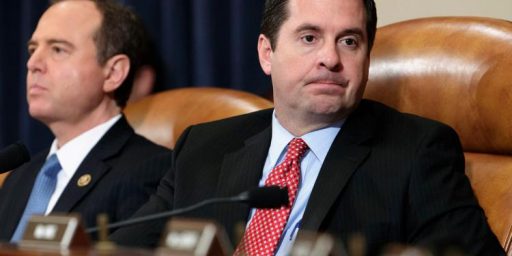NSA Surveillance Program Ruled Unconstitutional
A federal judge has struck down the controversial NSA warrantless interception program.
A federal judge ruled Thursday that the government’s warrantless wiretapping program is unconstitutional and ordered an immediate halt to it. U.S. District Judge Anna Diggs Taylor in Detroit became the first judge to strike down the National Security Agency’s program, which she says violates the rights to free speech and privacy.
Obviously, hers won’t be the final word on this.
UPDATE: Opinion here [PDF].
Paul Kiel provides excerpts. It’s pretty straightforward, although it has more editorializing than one expects of a district court judge. Indeed, written opinions are pretty unusual at that level.
Kiel cites this from p. 40:
The Government appears to argue here that, pursuant to the penumbra of Constitutional language in Article II, and particularly because the President is designated Commander in Chief of the Army and Navy, he has been granted the inherent power to violate not only the laws of the Congress but the First and Fourth Amendments of the Constitution, itself.
We must first note that the Office of the Chief Executive has itself been created, with its powers, by the Constitution. There are no hereditary Kings in America and no power not created by the Constitution. So all “inherent power” must derive from that Constitution.
That strikes me as a strawman of the executive’s position here. For one thing, the concept of “inherent power” dates, in the present context, from the administration of George Washington. It is not a novel thing advanced by the Bush team. It’s also not clear what First Amendment rights are supposedly in controversy. The issues are whether the executive’s interpretation of FISA was correct and whether, having informed the requisite legislative committees, it could bypass FISA’s strictures during time of grave national emergency. That’s not a slam dunk, although my preference is for checks and balances to hold under all but the most exigent of circumstances. Given that FISA essentially allowed the executive to reverse the traditional order of things–doing the search and then obtaining a warrant–it’s not clear that such exigency existed here.
Kevin Drum is right, though, when he says, “Obviously this will be appealed, and may soon be made moot by new legislation in any case.” (He follows that with “But it’s still encouraging that at least a few judges can still make sensible rulings these days.”) Indeed, I’m surprised it has taken so long to come to an accord on matching the law with present circumstances.






Before everyone starts about how activist judges are making America less safe, I’d like to remind everyone that the NSA can still use wiretaps. All this judge has done is ruled that the Executive branch has to have the oversight of the Judicial branch for domestic wiretaps.
Anyone who claims to support smaller, limited government should support oversight of the Executive.
Wowzer. Not the kind of issue I can comment on without reading the opinion (& then maybe not).
Jack Balkin’s blog will be a good place to look for commentary, I suspect.
Diggs is a Carter Judge. In 1979, Anna Diggs Taylor became the first black woman judge to be appointed to the United States District Court for the Eastern District of Michigan.
Hm, I forgot Glenn Greenwald. He has a summary, & notices this:
So not a total loss for the feds. Maybe next time they’re accused of running a secret program, they’ll SHUT UP about it instead of admitting it for purposes of political drama (“treason!” etc.).
In 1979, Anna Diggs Taylor became the first black woman judge to be appointed to the United States District Court for the Eastern District of Michigan.
And your point is … she can’t swim?
Fool. It is the time taken to get the approval that is the problem. These wire taps have to happen almost instantaneously for the taps to have value.
Fool. It is the time taken to get the approval that is the problem. These wire taps have to happen almost instantaneously for the taps to have value.
Right. If only FISA had provided for tapping first, then seeking approval later, say up to 3 days later … oh wait, it did.
Might want to rein in that particular F-word, my friend.
davod, the taps can happen instantaneously under FISA.The feds have up to 72 hours to provide the FISA judges justification for the surveillance. Looking at the FISA courts approval/rejection rate to date suggests the feds wouldn’t have much trouble clearing this hurdle.
Jack Balkin, no fan of the NSA program, is distinctly underwhelmed:
There is a certain sophomoric flippancy to the excerpts, at least.
I thought much of the opinion was pretty flimsy. The legal issues are clear enough: on the merits, Bush loses, but the standing section of the opinion seemed really, really strained. (I guess Althouse is the one to watch here. Despite being all kinds of wrong on standing in Hamdan, she still knows the black letter of the law better than anyone)
Glenn also makes an important point a ways in:
If it violates the Constitution, ordinary laws can’t authorize it. What I’m less sure of is – If Congress passed one of those oft-threatened “the courts can’t consider cases about subject X” laws, would that affect an appeal already in progress? Would they have to wait until a court ruled in Bush’s favor, and _then_ forbid further court action? Would that even apply, given that it’s still based on Constitutional issues, which are explicitly the Courts’ realm of interpretation?
Really? Even when half of Congress can’t decide whether they want to back the president or not and the other half actively wants him to fail?
But gosh, isn’t it wrong of Mr. Drum to insinuate that most judges can no longer make sensible rulings? That sounds almost hostile to the judiciary.
Henry Mark Holzer was quick to send out a bio of the judge in question to his newsletter subscribers. You’ll never guess who appointed Judge Taylor to the becnch. Answer at my place.
Charming, Bill. You know, she’s actually the _second_ judge to rule against the gov’t on the NSA’s wiretapping programs. Wann guess who appointed the first judge to the federal bench? Bush Senior.
although my preference is for checks and balances to hold under all but the most exigent of circumstances
Right. A five-year exigency strains the limits of “exigency.”
Agreed also that the op read more like a civics lesson than it needed to. There are real issues here, though I doubt the result should be any different.
OTOH, in a high-profile case such as this, it’s a given that the circuit court of appeals will start from scratch anyway, so why knock yourself out? 😉
Legion, didn’t that 1st judge rule solely on whether the state-secrets exclusion applied? He could still in theory rule that the program was both constitutional and legal.
Anderson,
Yes, but I’m just trying to point out the pathetic desparation of attacking a judge’s decisions solely on who appointed them to the bench, rather than on any, you know legal grounds.